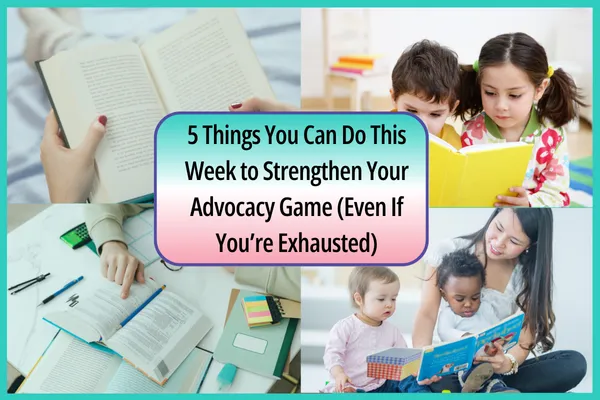
5 Things You Can Do This Week to Strengthen Your Advocacy Game (Even If You’re Exhausted)
Let me be real with you: If you’re feeling overwhelmed, tapped out, and like your brain is too full to hold one more thing, you’re not alone.
Advocating for your child in special education can feel like a full-time job on top of your actual full-time job, parenting, managing appointments, and just trying to get dinner on the table. Add a confusing IEP process, school pushback, and that constant sense of "Am I doing enough?" and it’s no wonder so many parents hit a wall.
But here’s what I need you to know:
Strengthening your advocacy game doesn’t have to mean overhauling your life or becoming a legal expert overnight. It’s about small, intentional steps that help you build confidence and clarity over time.
So if your current strategy is "barely hanging on" or "I’ll figure it out later," this is for you.
Here are five things you can do this week to become a stronger, more grounded advocate—without burning out.
1. Get Your Current IEP in One Place
This sounds simple. But most parents I talk to have IEP paperwork scattered across emails, folders, and half-open Google Docs. (No judgment. Life is messy.)
This week, carve out 30 minutes to:
Print or download the most recent IEP
Organize it into a digital or physical folder
Label it clearly with the date and school year
Why this matters: You can’t advocate clearly if you’re always scrambling to find the basics. When the IEP is easy to access, it becomes easier to understand, track, and use.

Bonus Tip: Add a one-page summary sheet at the front of the IEP. Just the essentials: key goals, services, accommodations, and contact info. This gives you a quick-glance tool for meetings, emails, and unexpected calls.
Check out my free IEP Binder Workshop HERE
2. Choose One Area to Learn More About
You don’t have to know everything. (Truly.)
But if you want to feel more confident in meetings or less anxious about what the school is saying, it helps to deepen your understanding of one thing at a time.
Pick a topic that’s been on your mind—maybe:
Accommodations vs. modifications
What’s actually required in a "specially designed instruction"
How to write a strong parent input statement
Progress monitoring (and why it matters)
Then:
Watch one video
Read one blog post
Listen to one podcast episode
That’s it. One focused learning moment, no overwhelm.
If you want help getting started, my Summer Learning Series breaks these down into small, doable chunks. You can start anytime.
3. Write Down One Win (Yes, You Have One)
When you’re constantly fighting for services or decoding teacher emails, it’s easy to feel like nothing is working. But even in the mess, there are always small wins.
Maybe:
You asked a hard question in a meeting
You pushed back on a vague goal
Your child had a good day and used a new strategy
Write it down. Keep a sticky note, a journal, or even a notes app entry labeled "Wins."
Why this matters: Advocacy isn’t just about knowing the law. It’s also about staying grounded in your why and remembering your impact. Wins are proof that what you’re doing matters.
4. Draft (Not Send) That Email That’s Been Sitting in Your Head
You know the one. The email you keep thinking about—to ask for a meeting, request data, or clarify a service that feels unclear.
This week, just draft it.
You don’t even have to send it yet. Just:
Open a blank doc or email
Get the thoughts out of your head and onto the page
Use clear, simple language (you don’t have to sound like a lawyer)
Writing it out will:
Give you clarity about what you actually want to say
Make it easier to hit send when you’re ready
Remind you that you can speak up—and you deserve to be heard
5. Find One Pocket of Community (Even If You Hate Facebook Groups)
Advocacy can feel so isolating. Especially when the people around you don’t understand what you’re dealing with. But here’s the truth:
You don’t have to do this alone.
This week, find one place where you can feel seen, understood, and supported.
Try:
A podcast that makes you feel less alone
A DM to a parent you connected with in passing
Joining a private group that actually feels safe (like The Enlightened IEP)
No performative positivity. No "just trust the school." Just real support from people who get it.
The truth is, your voice is stronger when it’s not carrying the full weight alone.
Join my free Facebook Community HERE
Let’s Recap: Your Bite-Sized Advocacy Plan for This Week
Organize your IEP. Make it easy to find and understand.
Learn one thing. You don’t need to know it all, just start somewhere.
Celebrate a win. Small victories matter. They count.
Write the email. You can speak up—and you don’t need the perfect words.
Find connection. You deserve a community that truly sees you.
None of these require a full day, a spreadsheet, or a legal background. But together, they build your foundation.
And from there? You can go anywhere.
Ready for More Support?
If this felt helpful, you're exactly who I built these resources for:
The Summer Learning Series: Short, digestible lessons to build your advocacy skills without the burnout.
Free Advocacy Starter Kit: Templates, checklists, and tools to take the guesswork out of speaking up.
The Enlightened IEP: My private community and coaching space for parents who are ready to feel more confident, informed, and supported in the IEP process.

You're not behind. You're not alone. And you’re more capable than you know.
I'm here when you're ready.
Join the Summer Learning Series
Learn More About The Enlightened IEP
Because when you advocate with clarity and confidence, everything changes.

